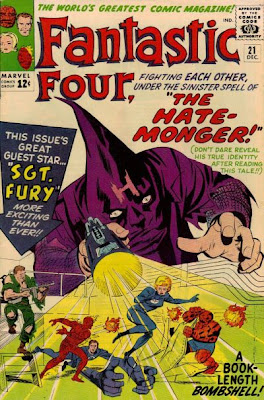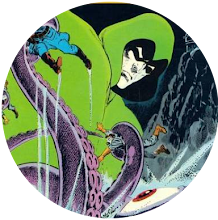Will it be any good? Will it make sense? Will it disappear so completely up its own backside that it comes out the other end?
None of us can know.
What we do know is the first episode goes by the endearingly arresting title of Let's Kill Hitler.
This is ludicrous.
We all know there's only one set of people allowed to kill Hitler.
And that's the Fantastic Four.
It's late 1963 and there's trouble on the streets of New York. A character called the Hate-Monger's spreading a message of bigotry and intolerance. Apparently the authorities can do nothing because he's so far broken no laws.
 |
| Unamerican Sentiments? Where's Joe McCarthy when you need him? |
Fortunately, Nick Fury, now a colonel in the CIA, is at hand to trick them into going to the well-known republic of San Gusto whose government the Hate-Monger and his men are trying to depose.
Together Fury and the Fantastic Four defeat the villain by turning his own hate powers against him, causing his own men to shoot him dead. It's then that we get the dread revelation...
...The Hate-Monger was none other than Adolf Hitler!
 |
| "Feuhrer"? |
There's also the problem of it featuring Nick Fury.
Long-suffering readers'll know I've never been the biggest fan of Fury, and his appearance here - with both continuity-busting eyes intact - does nothing to change my mind as he announces his presence by beating up the Baxter Building security staff just because they won't let him go barging unannounced into the FF's headquarters.
But of course the story's pivotal weakness is the revelation that the Hate-Monger is Hitler; as silly a denouement as was ever seen in a Silver Age Marvel comic - and let's face it, silly Silver Age denouements were not exactly hens' teeth in Marvel comics. The fact that, in the very next panel, Stan Lee has Mr Fantastic fling in the caveat that it might not be the real Hitler but just a look-alike, suggests Lee realised they were venturing too liberally into the valley of the absurd, and I do wonder if the Hitler thing was Kirby's idea, inflicted on Lee as a fait accomplis, with Lee trying to write his way out of it through dialogue.
It also has to be said that George Bell's inking's not great, looking crude, rushed and slapdash. It's a bit of a shock to the system for those used to the clean and classic lines of Joe Sinnott.
But of course, there's always something to like in a Silver Age Fantastic Four tale and, on the upside, the Hate-Monger's costume, with its hints of the Inquisition and medieval torturers, is a great design. The Hate-Monger himself - apart from the Hitler thing - is a potentially great villain, which probably explains why he returned on numerous occasions, his guise adopted by various baddies, including at one point the Man-Beast.
Nick Fury, despite my general dislike of him, does at least show a fair amount of intelligence in the way he quickly realises the Fantastic Four's quarrelsome behaviour must be down to the villain, and in the way he subsequently manipulates them into tackling the revolutionary forces of San Gusto.
So, in the end, I don't think this can be regarded as a classic tale, coming well before the strip's peak era, when it was still aimed at a relatively naive and undemanding audience.
Still, at least with Hitler dead, it means Dr Who isn't going to have to worry about killing him after all. Meaning, no doubt, that Saturday's episode's going to consist mostly of The Doctor, Amy and Rory sitting around doing nothing. In other words, the show exactly as it would be if I were allowed to write it.
Heaven only knows why I'm not allowed to write it.










































































8 comments:
I'll agree with everything you said, since I've read this comic and I remember nothing about it (which is rare for me) save the 'Hey, it was Hitler' moment.
I think Lee's lookalike comment was unnecessary: if you're going to be ridiculous, why not be COMPLETELY ridiculous!
I actually liked George Bell's inking on about 3-5 sequential FF issues during this period (and Avengers #4). I think I liked the crudeness of it. I think George Bell was George Russos.
I never minded George Bell/Roussos's inks on Steve Ditko's Doctor Strange, but I never cared for them on Jack Kirby's Fantastic Four. The only exception was the two-part Thing versus Hulk battle in FF #25 & 26 (I think) - for some reason it worked in those two issues.
Of all the hundred or so issues of the FF produced by Stan and Jack, the only 2 stories I've never read in some form or other are #20 ( Molecule Man origin ) and this one. And I have to say you're not selling it to me ;-)
Hey, word verification: "dedwar"
Is that the next George Romero movie?
More importantly, it's almost an anagram of Jedward.
In Brave & Bold #108, the villain turned out to be Hitler, who then turned out to be the Devil.
They clearly believed in giving us value for money.
Post a Comment